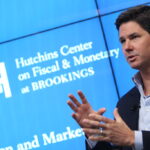Brazil’s Central Bank has warned against the risk of an extended cycle of rate increases, highlighting that expectations of inflation could hinder economic recovery.
The concern is due to the rising inflation expectations, and mounting fiscal pressures that have raised concerns about the ability of this country to maintain long-term growth.
The central bank increased its interest rate benchmark by 50 basis point during its policy meeting held on 5-6 November, making it 11.25%.
The central bank has taken this decision to highlight the severity of the current situation, as the inflation expectation is moving further from its target of 3%.
Minutes from the meeting showed that managing inflation by the bank is critical to the future of monetary policy and to the economic recovery in Brazil.
The causes of inflation are a combination of internal and external factors
The weak Brazilian real has increased inflationary pressures on imports.
Meanwhile, stronger-than-expected economic growth has further complicated the situation, catching analysts by surprise.
Although the labor market is tight, it has been difficult to raise wages, which contributes to inflationary cycles.
The central bank is now focusing on aligning market expectations with their inflation target, as this has been deemed essential for restoring economic stability.
Brazil’s financial health is still a major concern
The administration of President Luiz inacio Lula Da Silva has been under increasing scrutiny for its handling of public expenditure.
Market investors and economists are watching closely the efforts of the government to reduce spending, while also implementing fiscal reforms.
Lula’s administration, however, has been unable to come up with a comprehensive fiscal package to address these problems, which adds uncertainty to the economic outlook of the country.
Investor sentiment has deteriorated despite discussions with economists.
Central bank officials have stressed that long-term fiscal regulation is essential to rebuilding confidence in Brazil’s economic system.
Brazil’s growth prospects are expected to improve if it can limit public expenditure and introduce structural reforms.
Brazil’s finances could be stabilized, risk premiums reduced, and resources better allocated by promoting fiscal discipline.
Brazil’s recovery in economic terms is also influenced by factors external to the country, notably changes within the global economy.
Brazilian Central Bank expressed concern about the pace at which disinflation is occurring in the United States. It warned that US policies, ranging from fiscal stimuli to changes on the labor market could have ripple effects for Brazil’s management of inflation.
The Brazilian central bank may find it difficult to stabilize inflation due to these global shifts, especially as the inflationary pressures continue both at home and abroad.
Brazil’s central bank has taken a strong stance against inflation by warning about possible rate increases.
Increases in interest rates could have a negative impact on consumer spending and investment. They may also affect the overall economic growth.
Brazil’s future economic strength will be determined by the ability of the government to successfully implement fiscal reforms.
As new information becomes available, this post Brazil’s Central Bank warns against a prolonged rate hike cycle amid increasing inflation concerns could be updated.
This site is for entertainment only. Click here to read more






